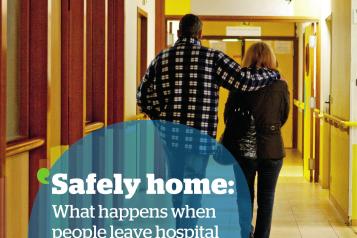A step closer to getting hospital discharge right
In July 2015 our report - ‘Safely Home’ – shone a light on this long-standing issue and called on the health and social care sector to take action to improve people’s experience of leaving services.
Recent news from the Department of Health indicates that we are an important step closer to achieving this.
The backstory
‘Safely home: What happens when people leave hospital and care settings?’ drew on stories from more than 3,200 people about their experiences of discharge in the context of older age, mental health conditions or homelessness.
Analysis of the experiences people shared with us and 101 local Healthwatch identified common reasons for people feeling their departure from a service was not handled properly. For example, people told us they were experiencing delays and a lack of co-ordination between different services.
Across all groups, we found that patients expect some simple things from the discharge process.
They expect:
-
To be treated with dignity, compassion and respect;
-
Their needs and circumstances to be considered as a whole – not just their presenting symptoms;
-
To be involved in decisions about their treatment and discharge;
-
To move smoothly from hospital to onward support available in the community; and
-
To know where they could go for help once discharged.
The report concluded that the human and financial costs of poor and unsafe discharge ought to provide “a new imperative for change” and called for “concerted action and coordinated national leadership”.
New programme to improve discharge
Shortly before we launched ‘Safely home’, the Department of Health and Healthwatch England chaired jointly a meeting of key national and local government, health, care and voluntary sector organisations to map out a way forward.
Discussions continued throughout 2015 and into 2016, informed by helpful reports from NHS Providers and the NHS Confederation’s commission on urgent care for older people.
The Department of Health Shared Delivery Plan now presents a number of opportunities for the Department and the NHS to tackle the challenges upon which ‘Safely home’ shone a light.
Most significantly, the Department has also established a new programme to develop a vision for improving discharge that all health and care services can share.
This is being overseen by a board representing the Department of Health, the Department for Communities and Local Government, NHS England, NHS Improvement, the Association of Directors of Adult Social Services and the Local Government Association.
It’s no surprise that this programme’s primary focus is on solving the problem of delayed discharge. After all, that presents major logistical and financial challenges that managers and policymakers know they have no alternative but to overcome.
However, it’s important to note that the programme’s scope also includes the need to improve patient experience and outcomes through more effective processes across health and care. As ‘Safely home’ illustrated, early discharge without the right support is just as problematic for people and services as unnecessary delays can be.
What happens next?
I’m pleased to be representing the Healthwatch network on the programme’s expert reference group, and to be able to report that the first meeting of that group was practical and purposeful.
We’ve already been working with NHS England as it improves the information available to staff and patients about the different aspects of leaving care. Now this wider programme provides a chance to make the right links nationally, as well as connecting local Healthwatch with new conversations at local and regional levels.
Many local Healthwatch continue to highlight where services need to improve on the ground.
We have also been working with NHS England as it improves the information available to staff and patients about the different aspects of leaving care.
However, this new programme provides a real chance to improve the experience of patients by driving change nationally, regionally and locally to ensure we get discharge right.


